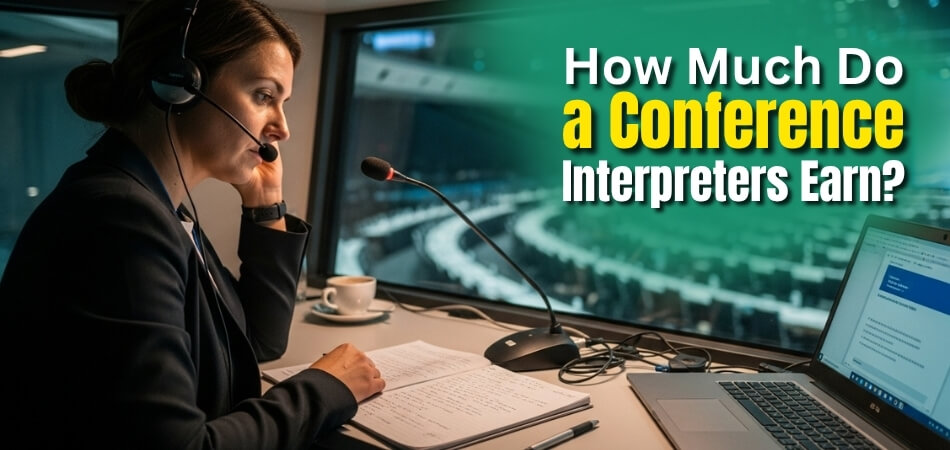Global meetings are made clear and easy for everyone by conference interpreters. They listen, translate, and share messages between speakers of different languages. Their work helps people from different countries understand each other. Many people who see them at international events often wonder how much do conference interpreters earn.
Conference interpreters earn between $35 and $140 per hour, depending on experience, language, and event type. Annual salaries range from $37,500 to over $83,000. Freelancers often earn more, charging up to $900 daily in some regions. Rates vary by location, specialization, and whether they work independently or full-time.
People interested in this field often look for clear details about pay, rates, and working styles. This article explains everything about how experience, language, and event type affect their income. It also covers payment models and useful tips to help interpreters earn better.
How Much Do Conference Interpreters Earn?
Conference interpreters play an important role in global meetings and events. Their pay depends on where they work and how much experience they have. Some work full-time for companies, while others are independent. Below you’ll find clear details about their yearly, hourly, and daily income.
Average Annual Salary
Many interpreters earn around $51,191 a year on average. Some reports say the median pay is about $65,000. Beginners earn around $37,500, while skilled ones can make more than $83,000. The yearly pay changes based on experience and the type of client.
Salary Range Differences
Pay changes a lot between new and expert interpreters. Those with special language skills or long experience earn higher rates. Freelancers usually charge more than employees because they manage their own time and clients. They also handle special meetings that pay extra.
Hourly Pay for Employees
Those who work as employees get paid hourly. The usual range is between $35 and $80 per hour. Their pay depends on the event size and language type. Interpreters for legal or technical events often get the highest pay rates.
Contractors and Freelancers
Independent interpreters earn more per hour than full-time workers. They often charge between $80 and $140 an hour. Many choose to charge by day or half-day instead. These flexible options make it easier for them to work with different clients across cities and even for upcoming conferences in Canada where interpreter demand is growing.
Daily and Half-Day Rates
For big meetings, many interpreters prefer daily pay. In many parts of Europe, they can earn 500 to 650 EUR a day. In Germany, the rates go up to 900 EUR daily. Half-day jobs pay less, but they are great for smaller business events or local conferences.
Why Rates Vary
Several things affect how much interpreters make. The language pair, event type, and country matter most. Global companies pay more for skilled interpreters. Demand keeps increasing as more people attend international events that need accurate language support.
Conference interpreting can be both interesting and well-paid. Your pay will depend on your skills, the type of client, and where you work. Freelancers have more control over their time and money. If you plan to enter this field, knowing these details can help you set clear goals.
Factors That Affect Conference Interpreter Earnings
Conference interpreting is a special skill that needs focus and strong language knowledge. The pay for interpreters is not the same for everyone. It depends on many things, like language pair, work type, and where they work. Let’s look at what affects their earnings in detail below.
Language Pair
Different languages have different demand levels in the market. If someone can work with rare or hard-to-find language pairs, they usually earn more. Common pairs like English-Spanish or English-French may pay less because many interpreters can do them. Rates often rise when fewer people speak the needed languages.
Experience Level
More experienced interpreters usually charge higher rates. They understand how to handle fast speakers and complex topics with ease. Clients trust their accuracy and calm nature during events. With more experience, interpreters also build a good reputation that helps them get better-paying jobs.
Event Type
Pay can also change based on the kind of event. Big international meetings or technical conferences usually pay more than small local ones. One of the key factors that influences pay is the difficulty level of conference interpreting, as more complex or technical events often require higher skill and experience, leading to better rates.
Country or Region
Earnings often depend on where the interpreter works. In countries with higher living costs, interpreters charge more for their services. Some regions also value certain languages more, which affects pay. International jobs or events in global cities often offer better rates than small local events.
Working Conditions
The setup and work hours can also make a big difference. Long sessions or events with heavy topics often mean higher pay. Some interpreters charge extra for travel, preparation, or working in noisy spaces. Good working conditions and fair contracts usually bring better income and satisfaction.
Conference interpreting can be a rewarding career with steady growth. Pay depends on skill, effort, and the type of work done. Those who keep improving and learning new languages often see better results. Understanding these factors helps interpreters plan smarter for higher earnings.
How Do Experience and Certification Impact Interpreter Income?
Being an interpreter takes more than just knowing two languages well. Experience, training, and certifications can greatly shape how much one earns in this field. Each step of learning and practice helps build both skill and reputation. Let’s look at how these factors add real value to an interpreter’s income growth.
Years Of Practice Build Strong Skills
Interpreters with more practice often handle complex jobs better. They can work faster, make fewer mistakes, and stay calm under pressure. With time, they also build strong client trust. This leads to more job offers and higher pay from regular clients or agencies.
Certified Professionals Earn More
Having certification shows clear proof of skill. Many clients or companies prefer certified interpreters because they can rely on their accuracy. Certified interpreters also get more job choices and higher pay rates. It tells people you take your work seriously and meet industry standards.
Training Improves Work Quality
Good training helps interpreters handle both general and special topics better. It also teaches them the right methods and ethics of professional work. Trained interpreters can take on medical, legal, or business jobs more easily. These specialized jobs often pay much more than basic translation tasks.
Specialization Adds Earning Power
Focusing on a specific area of interpreting often brings in higher pay. Legal, medical, or conference interpreting are good examples of this. Along with experience and formal training, choosing the right interpreting specialization options can make a big difference in how much an interpreter earns over time. Skilled specialists are always in demand.
Building Reputation Brings More Clients
A strong name in the field often leads to steady work. Happy clients tell others, and this word of mouth builds trust fast. Experienced interpreters with a good record often get private or high-profile jobs. The better your reputation, the better your long-term income will be.
Experience and learning are key parts of an interpreter’s success. Certification helps build trust, while years of steady work improve skill. Picking a clear field of focus also boosts career growth. In short, effort and learning always lead to better pay and stronger career results.
Typical Payment Models for Conference Interpreters
Many people wonder how conference interpreters get paid for their work. The pay system can vary depending on the type of event and client. Some payment methods suit short events, while others fit long ones better. Let’s look at the common ways interpreters are usually paid.
Hourly Pay
Some interpreters charge by the hour when jobs are short. This is common for short meetings, interviews, or small events. The rate may include preparation time and travel. Many interpreters also set a minimum number of hours for each booking.
Daily Pay
Many interpreters prefer a daily rate for full-day events. This covers their full attention for the day, even if not used every hour. It gives both sides a clear idea of the cost. Daily pay is the most common for conferences and seminars.
Per Session Pay
When an event has many short parts, pay may be per session. Each session can mean a speech, panel, or workshop. The interpreter’s rate is set for each session they handle. It helps match pay to the actual work time.
Contract Basis
Large or long events often use contracts for payment. This includes the full service, from setup to end. The contract may also cover travel, meals, and stay. This type gives both sides clear terms before work starts.
Combination Models
Some clients mix pay methods to match their needs. For example, daily rates for main events and hourly pay for extra meetings. It allows fair payment for all parts of the job. This mix works well for events that change in length or need.
Conference interpreters use flexible payment models for their work. The method depends on the event size, length, and client needs. Each model helps balance fair pay with clear terms. Choosing the right one helps both the interpreter and client work smoothly together.
Tips for Negotiating Better Rates as a Conference Interpreter
Negotiating better rates as a conference interpreter doesn’t have to be stressful. It’s about understanding your worth, setting fair prices, and standing firm with clients. When you approach it calmly and smartly, you can get paid what you truly deserve.
- Know the Market Rates: Check what other interpreters charge for similar work in your area. This helps you understand the fair range and gives you confidence when quoting your rate.
- Understand Your Value: Think about your skills, languages, and experience. When you know what makes you special, you can explain it clearly and ask for fair pay.
- Be Clear About Your Rates: Share your rates early in the discussion. Clients appreciate clarity, and it helps prevent misunderstandings or awkward talks about payment later.
- Include All Costs: Don’t forget travel, preparation, and any tools you use. Adding these in your quote ensures you cover every part of your work properly.
- Practice Confident Communication: When a client questions your price, stay calm and explain your quality and experience. Confidence helps you appear professional and builds trust easily.
- Offer Flexible Packages: You can offer different options like hourly, half-day, or full-day rates. This gives clients choices while keeping your value and time respected.
- Learn to Say No: If someone offers too little, it’s okay to walk away. Accepting unfair pay makes it harder to raise your rates later.
Confidence and preparation help you get fair pay for your hard work. When you believe in your value and stay clear with clients, negotiations become smoother and more successful every time.
FAQs About How Much Do Conference Interpreters Earn?
Conference interpreters often have many questions about their pay and work. Some wonder how they can earn more or what affects their income. Others want to know about job types, skills, and working hours. Below are clear answers to common questions about how much conference interpreters earn.
What Is The Average Starting Pay For New Conference Interpreters?
New conference interpreters usually start with modest pay as they build skills. Their early jobs often come from small events or local companies. Starting pay can be around $30 to $40 per hour in most places. With steady work and experience, they can soon move to higher-paying roles.
How Do Language Rarity And Demand Affect Interpreter Pay?
Rare languages often bring higher pay because there are fewer interpreters. For example, someone fluent in Japanese or Arabic might earn more than common pairs like English-French. Demand also rises during special events or trade meetings. The rarer the skill, the better the rate offered.
Do Interpreters Get Paid Extra For Travel And Preparation?
Yes, many interpreters receive extra pay for travel and prep work. Events often need study time for topic terms and background materials. Some clients cover travel, stay, and meals along with the main pay. It’s best for interpreters to include these details in their contracts.
How Do Remote And On-Site Jobs Compare In Pay?
Remote interpreting has become common and often pays slightly less than in-person work. On-site jobs usually pay more because they require travel and longer hours. Some interpreters prefer remote work for comfort and savings on travel. Both options can be profitable depending on the job type and the client.
Can Interpreters Earn More By Working With Agencies?
Working with agencies can offer steady jobs but lower rates per job. Agencies handle clients and contracts, which saves interpreters time. Freelancers earn more per hour but need to find clients themselves. Many interpreters work with both methods to balance steady income and flexibility.
Do Conference Interpreters Get Paid Overtime?
Some do, depending on the contract and event length. Long meetings or surprise extensions can lead to overtime pay. Clients usually agree on this before the event starts. Interpreters should always confirm these terms to ensure fair payment for extra time.
How Does Specialization In A Field Increase Pay?
Specializing in a field like medical or legal interpreting can raise income. These jobs need a strong understanding of special terms and accuracy. Because fewer people can do them well, they pay better. Interpreters who train for such fields often see steady work and higher rates.
Last Words
Conference interpreting is a respected and well-paid field where skill and effort matter most. With the right experience, training, and dedication, interpreters can build steady and rewarding careers. On average, they earn between $50,000 and $80,000 a year, depending on language and expertise. So now you know how much do conference interpreters earn?
To grow in this field, keep improving your language skills and stay updated with trends. Always value your time, prepare well for each event, and negotiate fair pay with confidence. Keep learning, stay positive, and may your interpreting career bring great success and satisfaction.








